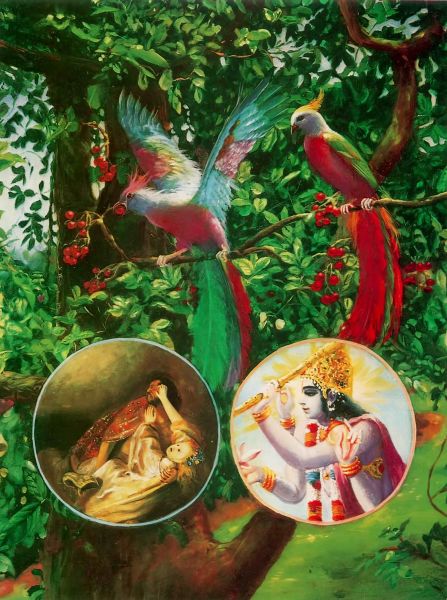|
TEXT 22
vasamsi jirnani yatha vihaya
navani grhnati naro 'parani
tatha sarirani vihaya jirnany
anyani samyati navani dehi
SYNONYMS
vasamsigarments; jirnaniold and worn out; yathaas it is; vihayagiving up; navaninew garments; grhnatidoes accept; naraha man; aparaniother; tathain the same way; sariranibodies; vihayagiving up; jirnaniold and useless; anyanidifferent; samyativerily accepts; navaninew sets; dehithe embodied.
TRANSLATION
As a person puts on new garments, giving up old ones, similarly, the soul accepts new material bodies, giving up the old and useless ones.
PURPORT
Change of body by the atomic individual soul is an accepted fact. Even some of the modern scientists who do not believe in the existence of the soul, but at the same time cannot explain the source of energy from the heart, have to accept continuous changes of body which appear from childhood to boyhood and from boyhood to youth and again from youth to old age. From old age, the change is transferred to another body. This has already been explained in the previous verse.
Transference of the atomic individual soul to another body is made possible by the grace of the Supersoul. The Supersoul fulfills the desire of the atomic soul as one friend fulfills the desire of another. The Vedas, like the Mundaka Upanisad, as well as the Svetasvatara Upanisad, compare the soul and the Supersoul to two friendly birds sitting on the same tree. One of the birds (the individual atomic soul) is eating the fruit of the tree, and the other bird (Krsna) is simply watching His friend. Of these two birdsalthough they are the same in qualityone is captivated by the fruits of the material tree, while the other is simply witnessing the activities of His friend. Krsna is the witnessing bird, and Arjuna is the eating bird. Although they are friends, one is still the master and the other is the servant. Forgetfulness of this relationship by the atomic soul is the cause of one's changing his position from one tree to another or from one body to another. The jiva soul is struggling very hard on the tree of the material body, but as soon as he agrees to accept the other bird as the supreme spiritual master—as Arjuna agreed to do by voluntary surrender unto Krsna for instruction—the subordinate bird immediately becomes free from all lamentations. Both the Katha Upanisad and Svetasvatara Upanisad confirm this:
samane vrkse puruso nimagno
'nisaya socati muhyamanah justam yada pasyaty anyam isam asya mahimanam iti vita-sokah "Although the two birds are in the same tree, the eating bird is fully engrossed with anxiety and moroseness as the enjoyer of the fruits of the tree. But if in some way or other he turns his face to his friend who is the Lord and knows His glories—at once the suffering bird becomes free from all anxieties." Arjuna has now turned his face towards his eternal friend, Krsna, and is understanding the Bhagavad-gita from Him. And thus, hearing from Krsna, he can understand the supreme glories of the Lord and be free from lamentation.
Arjuna is advised herewith by the Lord not to lament for the bodily change of his old grandfather and his teacher. He should rather be happy to kill their bodies in the righteous fight so that they may be cleansed at once of all reactions from various bodily activities. One who lays down his life on the sacrificial altar, or in the proper battlefield, is at once cleansed of bodily reactions and promoted to a higher status of life. So there was no cause for Arjuna's lamentation.
Link to this page: https://prabhupadabooks.com/bg/2/22
|

